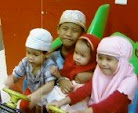Tazkirah
بسم الله الرحمٰن الرحيم
حَتَّىٰ إِذَا أَتَوْا عَلَىٰ وَادِ النَّمْلِ قَالَتْ نَمْلَةٌ يَا أَيُّهَا النَّمْلُ ادْخُلُوا مَسَاكِنَكُمْ لَا يَحْطِمَنَّكُمْ سُلَيْمَانُ وَجُنُودُهُ وَهُمْ لَا يَشْعُرُونَ
Until when they came to the valley of the Naml, a Namlite said: O Naml! enter your houses, (that) Sulaiman and his hosts may not crush you while they do not know.
The above ayat from surah an naml is one of my favourites. When i was young (sekarang pun mcm masih muda juga😁) i was taught by someone to recite the words of the ant (from ya ayuhan namlud...) to chase away the ants. And it usually works somehow. My brother once saw me do that and asked me what am i doing and said something which triggers something in me, what if the ants checked and saw theres no prophet sulaiman as and his army.
After much studying, i realised that this ayat is a very important ayah which we can and may derive many gems from it. Though some people might use it as a doa against ants and how it may seems it works, it is not a doa derived from the prophet saw and its companions ranhum ajmain. Just as my brother said, if the ants checked and there are no prophet sulaiman as, we telling them something which actually not happening.
Some scholars went into useless debates due to this ayat such as what is the gender of the ant that said the words, however, it is not important just like what is the colour of the ashabul dog, the nos of ppl in tbe ashabul kahf etc. Nevertheless below are some of the gems which we can derive from this ayat
1) this ayat told about the concerned of a particular ant for his community on the impending danger that is coming and make dakwah to his community.
This is a great lesson on the importance of (a) having concerns for unmah ; (b) love for ummah; (c) making dakwah ; (d) saving ummah from impending danger.
If an ant which we consider a small insignificant creature was honoured by Allah swt because of the above qualities, what will be of man, the best of all creation, having concerns for the ummah, love for them, constantly making dakwah and saving them from all kinds of dangers, especially the eternal hell fire. Surely and clearly he will be elevated by al Khaliq!
2) dont underestimate your own potential.
Even if you are a small creature like an ant, theres always great part you can contribute to the society and ummah.
3) dont underestimate any khair (goodness) although how small it may seems.
It may seems a small words or gesture but if it is good, don't ever belittle it. Hence never ever belittle any small acts that our brother did. Once it is accepted by Almighty, its rewards are bi ghoiri hisab! The Prophet saw said
((لا تحقرن من المعروف شيئا ولو أن تلقى أخاك بوجه طليق ))
Which means do not belittle from any of the goodness even such when you meet yr brother with a smiling /happy/ brilliant face!
4) helping one another for good things
And this is a special characteristics that can be found in ants wherever you go.
And there are many more gems inshaallah. But before i ends, we must know that ants are dignified creatures which The Prophet saw had prohibitted us from killing them.
Wallahualam bissowab
Zahri abuhanzolah
